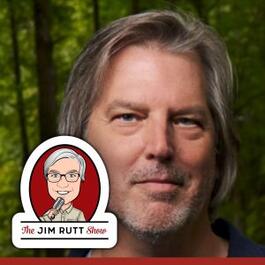
EP 168 Nate Hagens on Collective Futures
Jim talks with Nate Hagens about his new book co-authored with DJ White, Reality Blind: Integrating the Systems Science Underpinning Our Collective Futures, volume 1... Jim talks with Nate Hagens about his new book co-authored with DJ White, Reality Blind: Integrating the Systems Science Underpinning Our Collective Futures, volume 1. They discuss Nate's Reality 101 course, the core fundamental drivers of our current situation, writing "through an alien lens," steering away from optimism and pessimism, the tradeoff between accuracy and helpfulness, telling the truth & letting the chips fall, the buildup of underground carbon, the carbon pulse, a bank account of ancient sunlight, invention of the Newcomen atmospheric engine, the Jevons paradox, exponential growth in a finite world, disliking the word "degrowth," how humanity became a heat engine, gene agendas, advertising as the most deleterious invention, fast fashion, hypernovelty, trophic pyramids, the sixth great extinction, building a post-carbon life, energy as the currency of life, energy return on investment, why we don't want free energy, thinking about the future probabilistically, predicting a drop in the resource economy, hitting the reset button on finance, consumer abundance as a peacock's tail, and much more. Episode Transcript Propaganda, by Edward L. Bernays The Century of the Self (documentary by Adam Curtis) Dr. Nate Hagens is the Executive Director of The Institute for the Study of Energy & Our Future (ISEOF) an organization focused on educating and preparing society for the coming cultural transition. Formerly in the finance industry at Lehman Brothers and Salomon Brothers, since 2003 Nate has shifted his focus to understanding the interrelationships between energy, environment, and finance and the implication this synthesis has for human futures. Nate hosts the podcast The Great Simplification with Nate Hagens, in which he has conversations with experts in energy, ecology, government, technology, and the economy to provide a systemic view of the world around us.
From "The Jim Rutt Show"




Comments
Add comment Feedback